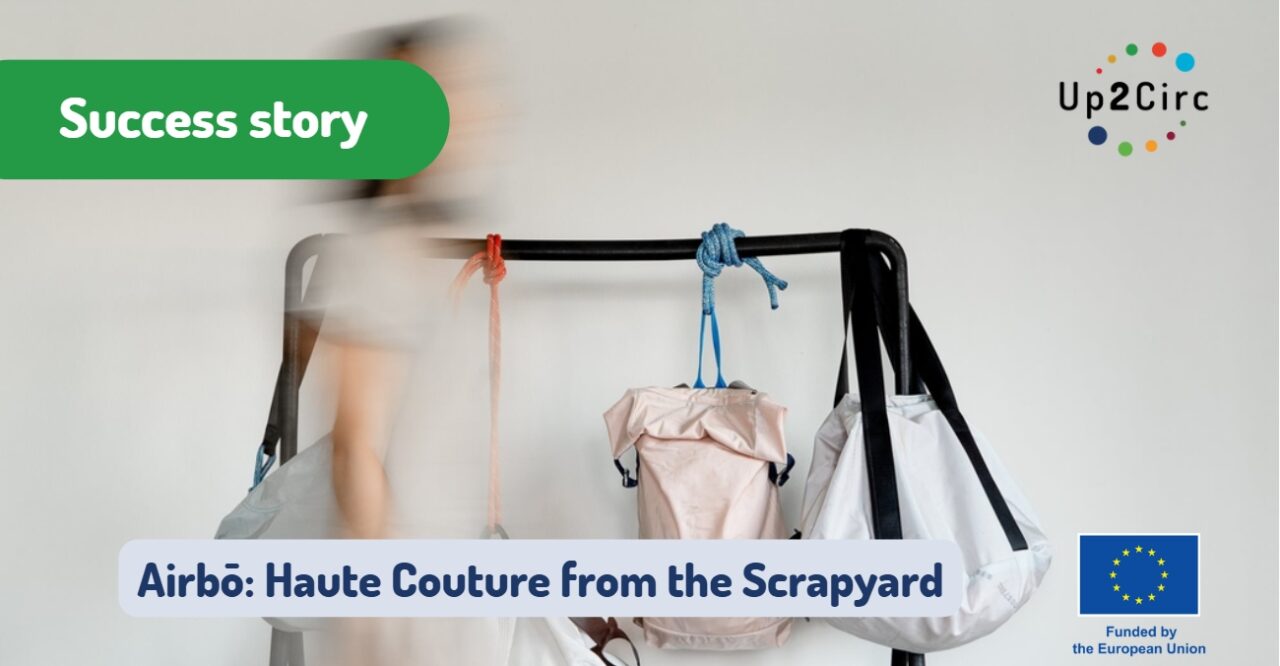Czech brand Airbō transforms discarded airbags into premium bags and accessories. With support from the Up2Circ program, the company has optimized its production to achieve zero waste – turning leftover material into yoga cushions.

SECTOR
Fashion & Textiles
CHALLENGE
The lucky ones never see them in their lifetime. For the less fortunate, they can (in the best case) save a life. Airbags are made from a completely unique material. Yet after years in a car, they go straight from the scrapyard to the incinerator.
SOLUTION
“Why bags specifically from airbag fabric? Even though it’s a very technical material, it has many properties that are ideal for bags,” explains Pavla Podsedníková. Pavla is one of two designers and co-founders of Studio Naranu, which is behind the Airbō brand. “Because it has to withstand impact, it’s a very durable material that’s difficult to cut through. It’s flame-resistant, and despite all that, it’s very lightweight, soft, and has a silky sheen. It’s actually – perhaps surprisingly – a very beautiful textile,” she describes.
Together with Markéta Šohajová, they were clear about the studio’s focus on upcycling from the very beginning. But they searched a long time for the right material – and when decommissioned airbags came into their hands, they knew they’d found it.
CIRCULAR ECONOMY STRATEGIES/BUSINESS MODEL IMPLEMENTED
For most cars, airbags (fortunately) never have to deploy. But when they do, something like “airbag popcorn” happens. “A new car can have up to 25 airbags. Each has a different shape – the steering wheel one is round, the passenger airbag is kidney-shaped, it’s really quite varied,” explains Pavla Podsedníková. The designers purchase bags of airbags in various shapes directly from scrapyards.
For a long time, they also adapted bag patterns to these shapes: from large ones they sewed backpacks, from smaller ones small bags. But they were very dependent on what material they could obtain at the scrapyard, and – what bothered them more – despite their best efforts to use as much material as possible, some waste remained.
They were therefore looking for a way to utilize it, to optimize production, and to change the patterns of individual products. And with this goal, they applied to the Up2Circ program.
Up2Circ: Progress in 3 Areas and 100% Airbag Material Utilized
Participation in the program fundamentally advanced them in three areas: 1. they found a way to process waste material, 2. they found a use for this material, and 3. they optimized bag patterns.
They now have significantly less leftover material, and they newly grind it into fine batting, which they use to fill a new product: so-called poufs for yoga studios. “The product is partly upcycled and partly downcycled. But we’re currently completely zero-waste,” smiles Pavla Podsedníková.
Another major benefit of the Up2Circ program was external consultations with a waste expert. The idea of utilizing waste material is more than commendable, but with good intentions you can run into legislative obstacles. “We’re not officially a waste processor, so it involves fairly complex legislation. The program helped us move forward in finding a path for how to obtain waste material from scrapyards in the future,” explains Pavla Podsedníková.
Pavla Podsedníková on the Up2Circ program:
“What we really appreciate about Up2Circ is its administrative accessibility. We recently completed another program, and just to fill out the application, we had to hire an external company. That’s not needed with Up2Circ – the application is simple, clear, and logical.
Thanks to financial support of 340 thousand crowns, we managed to optimize the technical side of our products, and consultations with waste experts moved us forward on the legislative side. We would definitely recommend it to all companies looking for a path to circularity.”
IMPACT
At Airbō, you’ll experience something that used to be completely normal: repairing broken things. “The product material itself is very durable, but after extended use, something might happen to the zipper, for example. We commit to repairing anything that breaks for customers at a fixed price,” says Pavla Podsedníková. She believes that repairs should be a standard part of thinking about products.
Czech brand Airbō has transformed airbag upcycling from a material-dependent craft into a zero-waste circular business model, proving that even highly technical automotive materials can find new life in premium fashion accessories.
